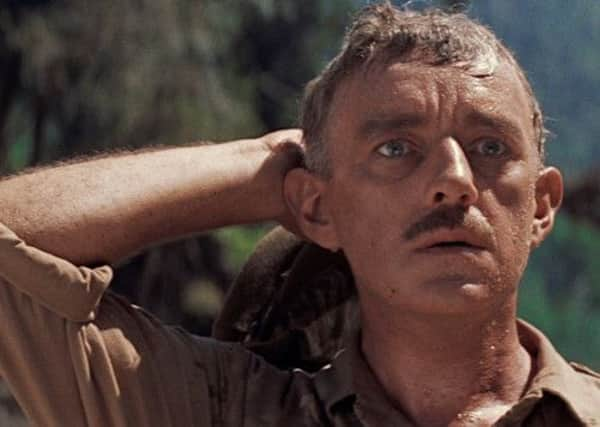Broader picture of movie classics


When film producer turned peer David Puttnam described the Pictureville in Bradford as “the best cinema in the world” he wasn’t just trotting out platitudes.
A movie buff as much as he is a filmmaker, educationalist and historian, Puttnam saw something very special in the construct of a cinema that strove from its day of opening to be unique.
Advertisement
Hide AdAdvertisement
Hide AdTwo decades on from its launch, Pictureville continues to be a magnet for lovers of film. It has been at the heart of Bradford International Film Festival (BIFF) since the event’s beginnings in 1995. But for lovers of truly big screen cinema it is also wedded to another, wholly unique, event: the Widescreen Weekend.
If BIFF seeks to attract an international element to the city then the delegates who travel in for the Widescreen Weekend provide it. They fly in from Germany, Holland, Australia, the United States, Spain, France, Ireland and Denmark. The UK is represented, too. But it is for its global reach that the Widescreen Weekend is considered a winner.
This year the event falls outside the main film festival – the first time since its inception in 1993, two years before BIFF was founded. In that respect it has regained some of its exclusivity as a brand that celebrates classic cinema – the kind they don’t make ‘em like anymore.
A quick flick through the 2013 brochure and one stumbles over an array of retro gems including The Guns of Navarone (Quinn, Peck, Niven, Baker), The Great Escape (McQueen, a bike and a barbed wire fence), The Sound of Music (Dame Julie as a singing nun) and How to Marry a Millionaire (Monroe, Bacall, Grable). And it’s not necessarily the titles that draw in the aficionados. It’s also the multifarious (and sometimes archaic) formats.
Advertisement
Hide AdAdvertisement
Hide AdWhen it was conceived by the-then National Museum of Photography, Film & Television, Pictureville’s claim to fame was that it could play all current film formats from 16mm to 35mm and beyond.
But the attraction for widescreen buffs was that it could also play mighty 70mm and the obsolete three-strip Cinerama process – one of just a handful of sites on the planet to do so.
Then, as now, fans flock to Bradford to wallow in the glories of widescreen cinema. Conversations are peppered with references to Panavision, VistaVision, CinemaScope, Todd-AO, Cinerama and even the short-lived (and obscure) Circlorama. It’s not just about the movies.
Widescreen Weekend creator Bill Lawrence recalls: “We had Cinerama, 70mm and IMAX, the complete range of widescreen facilities. We thought it would be a good idea to do a festival that would celebrate the biggest and best of cinema.”
Advertisement
Hide AdAdvertisement
Hide AdIn October 1993 the first Widescreen Film Festival – billed as “the only venue in the world where you can see films in 70mm, Cinerama and IMAX” – came together in two weeks with David Lean’s Lawrence of Arabia and Stanley Kubrick’s 2001: A Space Odyssey in 70mm, some CinemaScope films, and the background of IMAX. Guests included director Peter Greenaway with his film The Cook, the Thief, his Wife and her Lover.
In 1995 on the launch of the city’s brand new film festival Lawrence and his team screened 70mm titles throughout the two-week event, “but it became clear that if we compacted the screenings into one weekend then people would stay and watch films all weekend.”
From a quiet start of around 60 people the message rapidly went global. “Over the years the core audience has grown to more than 200 people who come from all over the world, from the US to Australia and most countries of Europe,” adds Lawrence. “It has become an extraordinary community of people who meet every year and catch up on their passion: widescreen cinema.”
This year’s Widescreen Weekend programmer is Duncan McGregor, an enthusiast for film who has grasped the nettle of evolution and scattered the three-day event with traditional prints and state-of-the-art digital transfers at crystal-clear 4K resolution.
Advertisement
Hide AdAdvertisement
Hide Ad“The last two years have seen a significant shift in the way most of us now watch films, with the widespread switchover from viewing conventional film prints to digital ones,” he says.
“Continued steps to improve presentation standards from 2K to 4K mirror the efforts made to heighten visual quality during the 1950s, when 70mm became the recognised hallmark of excellence.”
McGregor’s is a proselyting mission. He wants to give both mature film fans and an entirely new generation the chance to travel back in time to experience classic movies anew or for the very first time.
Even the cognoscenti flock to Bradford when they hear of a special screening. Sir Kenneth Branagh turned up in 2008 when his four-hour version of Hamlet was projected in 70mm.
Advertisement
Hide AdAdvertisement
Hide AdAnd often mingling among the buffs can be found authoritative figures such as silent movie expert Kevin Brownlow and academic and historian Professor Sir Christopher Frayling.
“Over the years we have had some fantastic guests from Kenneth Branagh to Beverley-born Ken Annakin and many more of the behind-the-camera talents that make cinema great,” says Bill Lawrence who still acts as consultant for the festival. “It has been remarkable to meet so many incredible people in Bradford. It’s felt like the centre of the world.”
The 19th Widescreen Weekend runs from March 26-29 at the National Media Museum. www.bradfordfilmfestival.org.uk